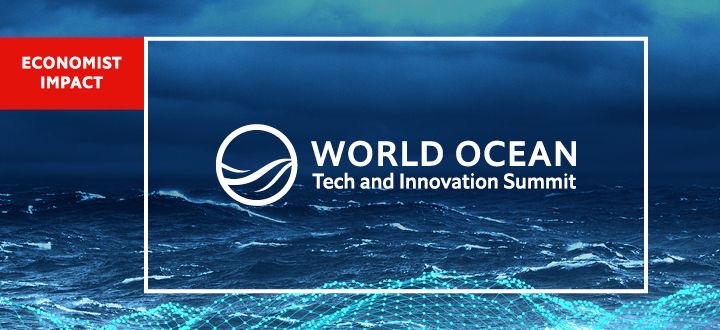Britain's leading global affairs magazine, The Economist, hosted its World Ocean Tech and Innovation Summit at the Halifax Convention Centre this week.
The event drew blue economy leaders from across Canada and around the world, including delegates from major companies and NGOs.
Sponsored jointly by Canada's Ocean Supercluster, the provincial government, the Halifax Partnership and Creative Destruction Lab, the conference attracted international attention for Atlantic Canada at a time when the regional oceans economy has demonstrated its ability to produce notable companies like St. John’s-based Kraken Robotics and Halifax’s Ashored Innovation.
Here are three takeaways from the summit that are relevant to startups:
Oceans of Data
Data gathering, consolidation and analysis processes in the blue economy are often less sophisticated than in other sectors.
Mike Greenley, CEO of satellite imaging giant MDA, Liz Ferguson, the CEO of San Diego research institute Ocean Science Analytics, and several other speakers all said the immature state of big data in the oceans sector means the economic value that could be captured from even modest efficiency gains is dramatic.
There are at least two stumbling blocks in the space, however: a Balkanized data ecosystem and uncooperative national governments.
Aggregating data related to the oceans is complex because the organizations from which it originates are numerous and diverse, as well as because companies’ fiduciary obligations to their shareholders often prevent them from freely sharing potentially valuable information.
And for marine researchers, intensive scrutiny by governments worried that data collection could compromise the security of infrastructure like subsea internet cables and gas pipelines means even securing permission to conduct measurements can be problematic.
“The issue is within 200 miles (of the coast), the so-called exclusive economic zones of these countries,” said Victor Vescovo, a former American naval officer who now develops deep-sea research submarines.
“Nations have the right to regulate marine scientific research within 200 nautical miles of their coast … But now, what countries seem to be doing is using the ambiguous and undefined terms of ‘marine scientific research’ to effectively make that 200 zone de facto territorial waters.”
The Long View on Labour Markets
Oceans companies are being squeezed by the same shortage of technically skilled workers plaguing terrestrial startups.
Part of the problem, according to Eco Canada’s Sarah Casorso and Halifax Port Authority CEO Captain Allan Gray, is that public misconceptions about the blue economy are pervasive, hampering recruitment. Casorso and Gray both described a widespread belief among young people that oceans jobs are limited to the fishing and shipping industries.
As well, the overlap in skills needed by bluetech companies and other types of innovation-driven businesses means that the pool of skilled technologists needs to increase economy-wide before the ocean sector's labour crunch can be fully solved.
“We haven’t increased the pool (of workers),” said Gray. “We’ve been fighting for the same resources.
“There has to be a focus on creating the pool, and that comes back to awareness in young people to say that by going into these degrees and training pathways, here’s a wide variety of industries and sectors that are open to you.”
A possible long-term strategy for reducing the pressure on employers is to recruit more workers from historically underrepresented groups, including women and BIPOC people.
“There’s a lot more we can be doing in the education system from a much younger age to get them feeling more confident, or engaged, or interested in STEM courses, but also STEM careers,” said Sherry Scully, director of workforce development at The PIER, the Port of Halifax’s living lab.
“And I think when we do that, we capture a much broader range of students, rather than just the few that were heading down that pathway to begin with.”
Keep Calm and Carry On — But Not Too Slowly
A recurring consensus among the Ocean Summit’s more than 40 speakers was that bluetech represents a critical opportunity for climate change mitigation.
Experts like Anya Waite, CEO of the Halifax-based Ocean Frontier Institute, as well as prolific investor and Clearwater Seafoods Co-Founder John Risley, said the oceans could represent a massive source of low-hanging fruit from a standpoint of greenhouse gas reduction.
That opportunity exists partly thanks to gains that could be made in energy and transportation, and partly thanks to the ocean’s status as the largest natural carbon sink on Earth, even despite the tenuous health of many marine ecosystems.
But with venture capital markets tightening and valuations dropping, capital intensive oceans startups will have to work harder to access funding. Asked by Entrevestor what VC market volatility has meant for his approach to oceans investing, Risley said he does not see the ongoing contraction as an existential threat to bluetech innovation.
He added that now more than ever, entrepreneurs who are “technocrats” more than salespeople need to find a co-founder with good soft skills.
"The consequence of capital being more difficult to find will be that better quality businesses will get supported, and ones that probably didn't have a particularly good chance of succeeding won't," he said.
"And that is really down to the people skills of the founding entrepreneurs. How good are they at communicating? How good are they at selling their ideas?"
He also warned in his keynote address, though, that the growing severity of climate change and generally slow progress towards international emissions reduction goals make the blue economy a particularly time-sensitive sector in which to be innovating.
“We can’t continue to ignore the fact that we’ve got this vast geographic resource,” Risley said.
“This is not just because it’s a great economic opportunity. It’s because you can’t be alive today and not be bloody scared about what’s going on with the climate.”










